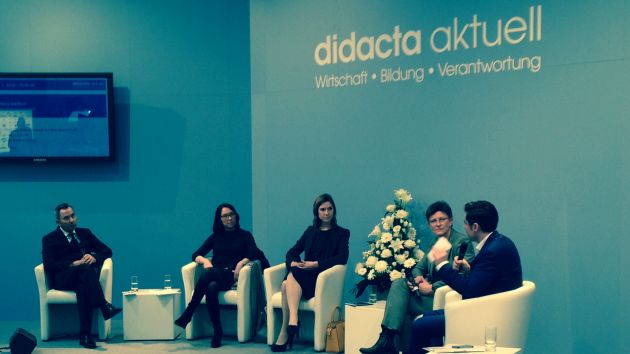A recent investigation published by German research institute forsa found that only 38 percent of the teachers surveyed frequently make use of digital media in their lessons. Not only that, but the teachers estimate preparing lessons using digital media involves just as much work as preparing traditional lessons. Why should that be? And, most importantly, what needs to be done to strengthen the digital media skills of teachers and their students? How can the educational potential of digital media be better exploited for teaching and learning? These and other topical questions were among the matters discussed by participants in the “didacta aktuell” forum held on February 26 in Hanover as part of didacta, Europe’s largest education trade fair. The forum brought together Prof. Dr. Fthenakis, President of the Didacta Association, Dr. Nathalie von Siemens, Managing Director and spokesperson of Siemens Stiftung, and a number of other contributors from the spheres of education and politics to discuss learning concepts of the future and examine, from political, educational and technological angles, the challenges facing German schools at the moment.
“The demands on the system have expanded enormously over recent years. Teachers have to impart all kinds of different skills to their students, from critical thinking in a global context to the ability to cooperate effectively with people from different backgrounds, while still also managing to pass on essential subject knowledge. Digital media are no guarantee of good teaching in this context, but used in the right way in educational settings they can be a valuable aid to students in their general learning while simultaneously teaching digital media skills,” explained panel discussion contributor Nathalie von Siemens.
The strategic use of digital teaching content opens up new educational possibilities for a shared learning experience across social boundaries while simultaneously providing every student with personalized preparation for working life in the digital age. Siemens Stiftung has been promoting inclusive teaching that caters for the specific needs, capabilities, and interests of individual students for over six years through its media portal. The digital teaching materials provided through the portal are designed to support students in the STEM subjects in particular (science, technology, engineering, and mathematics) across all types of learning, from independent study to group exercises and experiments. Designed by education experts, the topics are presented in a multifaceted way that covers practical uses and social implications as well as the underlying scientific principles. This encourages students to think systematically and understand global connections and interactions.
The media portal is currently being upgraded to create an OER (open education resources) platform and will relaunch in April with an initial offering of around 300 media resources. These materials will be made available under an open license, which means they can be edited, distributed and reissued without restriction. New materials will be added to the portal on a continuous basis. UNESCO has called for all people to have access to a good education. Now Siemens Stiftung is playing its part in making this happen.



